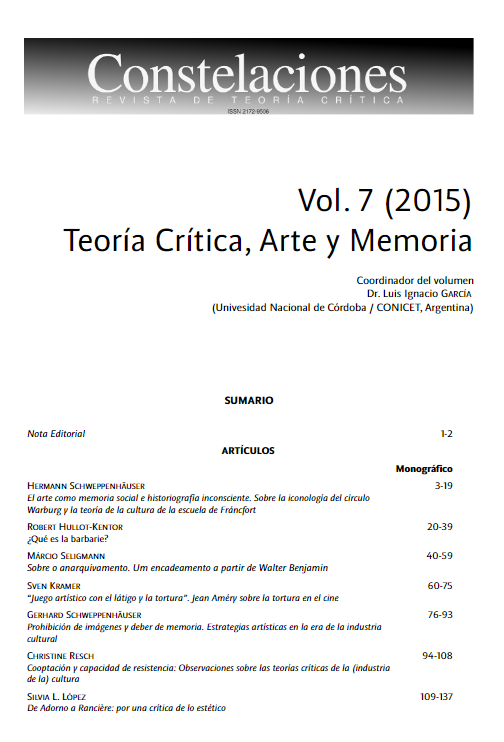The Prohibition of Images and the Duty of Memory. Artistic Strategies in the Era of Cultural Industry
Keywords:
art, memory, Auschwitz, critical theory, trauma, representation, ima- ge, sublime, mediality, experienceAbstract
This paper analyzes what are the possibilities of art, in the era of the culture industry, regarding the memory of Auschwitz as a breach of civilization. The framework of this analysis is critical theory. The starting point is the critic of the image by authors such as Adorno, Marcuse or Postman. Further, it analyzes the relations between art and memory and its role in the politics of memory. In the case of a traumatic past, the relationship between art and memory stands under the sign of a crisis of representation. This is reason for the aesthetic proposal of the sublime. Finally, the article analyzes several artistic proposals regarding the framework of the theoretical problems discussed above.Downloads
Downloads
Published
How to Cite
Issue
Section
License
Authors who have publications with this journal accept the following terms:
1. Authors will retain their copyright and grant the journal the right of first publication of their work, which will be simultaneously subject to the License of recognition of Creative Commons CC BY-NC-SA 4.0 that allows third parties to share, redistribute and adapt the work provided it is for non-commercial purposes and its author and first publication in this journal is indicated.
2. Authors may adopt other non-exclusive distribution license agreements for the version of the published work (e.g., depositing it in an institutional electronic archive or publishing it in a monographic volume) provided that the initial publication in this journal is indicated.
3. Authors are permitted and encouraged to disseminate their work via the Internet (e.g., in institutional telematic archives or on their website) before and during the submission process, which can produce interesting exchanges and increase citations of the published work. (See The Effect of Open Access).
Data confidentiality
1. Constelaciones. Revista de Teoría Crítica guarantees that the data you send us will only be used to meet the requests made in this message.
2. Your data will not be passed on to third parties.
3. You may request that your data be removed from our records at any time.





